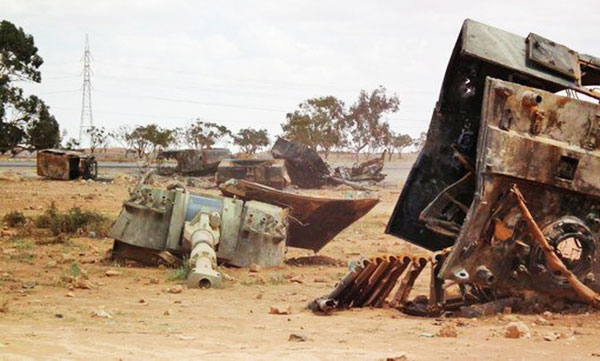|
CC BY 2.0
The summit meeting of the North Atlantic Treaty Organization (NATO), the military alliance that is expanding its deployments of troops, combat and surveillance aircraft and missile ships around Russia's borders, took place on July 11-12 and was a farce, with Trump behaving in his usual way, insulting individuals and nations with characteristic vulgarity.
Before the jamboree, NATO's secretary general, Jens Stoltenberg (one of those selected for a Trumpian harangue), recounted in a speech on 21 June that,
But then he had a bit of a rethink when he was asked a question about whether NATO had learnt any lessons that might make it think about "intervening in the future."
To give him his due, Stoltenberg replied that he thought,
He is absolutely right about that...
The US-NATO military interventions in Iraq, Afghanistan and Libya have been catastrophic.
It is intriguing that NATO's secretary general can at last admit that military muscle doesn't solve every problem. But he did not expand on the subject of Libya, which unhappy country was destroyed by US-NATO military intervention in 2011.
It is interesting to reflect on that particular NATO debacle, because it led directly to expansion of the Islamic State terrorist group ISIS (below video), a prolonged civil war, a vast number of deaths, and hideous suffering by desperate refugees trying to flee from Libya across the Mediterranean.
Towards the end of the West's seven-month blitz on Libya its leader, Muammar Gaddafi, was murdered by gangs supported by US-NATO, which caused the US Secretary of State, Hillary Clinton, to giggle "We came; we saw; he died" in this below interview on CBS:
It was a good indicator of how the 'peace-loving' West approached its devastation of a country whose president had plenty of flaws but whose main mistake was to threaten to nationalize his country's oil resources, which were in the hands of US and European oligarchs.
Gaddafi was a despot who persecuted his enemies quite as savagely as the Western-supported dictator Hosni Mubarak in neighboring Egypt, but life for most Libyans was comfortable, and the BBC had to admit that Gaddafi's,
The CIA World Factbook noted that in 2010 Gaddafi's Libya had a literacy rate of 82.6% (far better than Egypt, India and Saudi Arabia), and a life expectancy of 77.47 years, higher than 160 of the 215 countries assessed.
But the West was intent on getting rid of Gaddafi, and managed to fudge a United Nations Resolution to begin the war.
(Germany, under the 'wise leadership' of Angela Merkel, refused to have anything to do with the long-planned carnival of rocketing and bombing.)
Gaddafi was murdered on October 20, 2011, in particularly disgusting circumstances, and ten days later the US-NATO alliance ended its blitzkrieg.
The normally sane Guardian newspaper of the UK reported that the operation had demonstrated,
...while the secretary general, Anders Fogh Rasmussen, proclaimed the end of,
The "successful chapter" involved 9,600 airstrikes that amongst other destruction,
As the Christian Science Monitor reported in 2010,
Not any more, they don't, and there is now a critical water shortage
One recent observation was that,
Thank you, US-NATO, for "liberating" Libya...
Two prominent figures involved in the US-NATO war on Libya were,
As they ended their war, on October 31, 2011, these two ninnies had a piece published in the New York Times in which they made the absurd claim that,
Well, there's no doubt that "limited force" - if you call 9,600 airstrikes "limited" - can produce political change, but it is difficult to see how even these two twits could think for an instant that it would be "positive."
Then Rasmussen lobbed in to Tripoli on 31 October and announced that,
The Western mainstream media, which was so supportive of the war, has not asked the team of Rasmussen, Stavridis and Daalder how they feel about the current catastrophe in Libya that they did so much to accomplish.
There are few reports in western newspapers or TV outlets about the gravity of the shambles (search, for example, the New York Times and the Washington Post), but such organizations as Human Rights Watch keep the world informed about what is going on.
Its 2018 World Report records that,
Thank you US-NATO, and especially thank you, President Obama and Messrs.
Rasmussen, Stavridis and Daalder, and all the 'brave' pilots who had a wonderful blitzing shindig, and all the 'brave button-pressers' on US and UK Navy ships whose Tomahawk missiles blasted the cities.
The country you wrecked will take decades to recover from your use of what you called "limited force," and the amount of human suffering you caused is incalculable.
NATO'S Jens Stoltenberg seems to have learned the lesson, albeit belatedly, that military force does not solve what NATO regards as 'problems.'
That's to be welcomed, and what would be even more welcome would be realization that provocation and the threat of force don't work, either, and therefore that it would be wise to stay out of wars and to draw-down the confrontational US-NATO deployments along Russia's borders.
|


